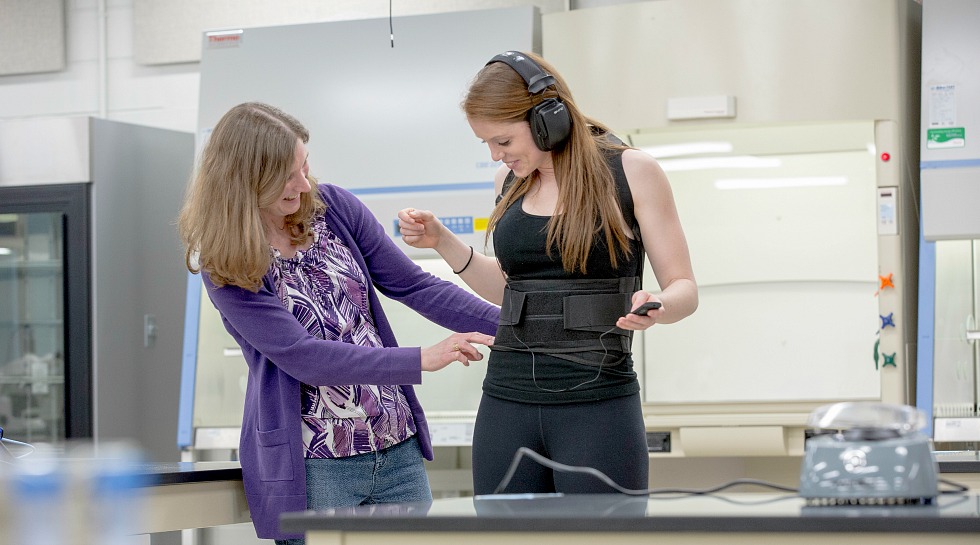New lab course brings Mac’s world-class aging research to undergrad experience

Lab technician Geneviève van Wersch (left) helps student Samantha Maloney put on a specialized body suit designed to mimic many of the physical effects of aging. From tinnitus, to back pain, to stability and arthritis, the suit allows the wearer to actually experience how the aging process impacts the human body. It’s one of the innovative ways students in a new lab course – Life Sciences 2L03 – are learning about research methodologies.
BY Erica Balch
May 1, 2017
Undergraduates in a new Life Sciences lab course are feeling what it’s like to age – literally.
Students in Life Sciences 2L03 put on a specialized body suit designed to mimic many of the physical effects of aging. From tinnitus, to back pain, to stability and arthritis, the suit allows the wearer to actually experience how the aging process impacts the human body.
It’s just one of the ways that students in an innovative new lab course – the first of its kind in the Life Sciences program – are learning about different aspects of aging while being introduced to research methodologies used by leading aging researchers across McMaster.
“We want our students to graduate with core research skills,” says Kimberley Dej, associate professor in McMaster’s School of Interdisciplinary Science (SIS) who developed the course in collaboration with Ryan Belowitz, instructional assistant in SIS. The course was offered for the first time this year and going forward will be taken by all students in the Life Sciences program.
“We chose the theme of aging because it is a question that’s of personal interest to all of us,” she says. “Students are living with their parents, and even their grandparents. They’re interested in careers in health care and the majority of their patients are going to be over the age of 65 when they’re in those careers.” In addition, the study of aging is interdisciplinary. This course introduces students to ways of thinking about research in health care in an interdisciplinary way.”
A team of faculty and staff in SIS worked with experts in aging research from a number of disciplines across campus, incorporating McMaster’s world-class research into the undergraduate experience. Together, they designed and co-taught ten lab modules, which introduce students to a different aspect of aging each week.
“We thought about the questions we could ask to understand human aging,” says Dej. “From a kinesiology perspective we look at frailty and what’s happening to the bones and the muscles. Using histology techniques, we see what happens to skin as the body ages. We have an epidemiology lab where we look at the changes in the immunological response to influenza infections that occur as we age.”
Working in a brand-new, state of the art lab space, called the Living Systems Lab, students were given a question and an experiment to perform at the beginning of each module. Then, working in groups, students designed the experiment, collected and analysed the data, and communicated their results.
“It has worked really well. The students have been engaged, they are working collaboratively, they’re excited about these research questions.” says Dej. “This lab space has made it possible.”
“Students can walk around the lab and talk to each other, access different pieces of equipment, and talk to the TAs,” she says. “The course is valuing students as potential researchers. We are saying, ‘welcome to the lab, now have fun and explore.’”
Dej is currently collaborating with McMaster researchers to bring more cutting-edge research into the course next year, including working with the Origins Institute to artificially age skin and looking at research from the Canadian Longitudinal Study on Aging.
“When we talk to researchers in the field of aging research from across McMaster and we tell them about this course, they’re excited and they want to get involved,” she says, adding that the students benefitted from the opportunity to learn from researchers.
“Students notice the difference – they really feel like they’re doing something authentic when there is a researcher involved,” she says. “I’m really happy about how that’s working and I’m looking for ways to build those kinds of relationships in other lab courses as well.”
View 360 degree video of the new Living Systems Lab:

